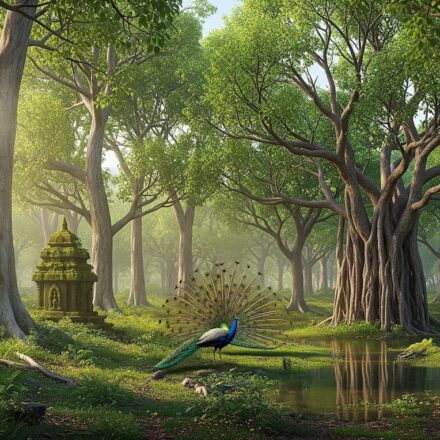
Prithvi Sukta’s Prophecy: An Ancient Hymn’s Urgent Message for Modern Earth
We live in an age of ecological anxiety. We hear daily reports of melting ice caps, rising sea levels, and species extinction. In response, we look to science and technology for solutions, hoping for a breakthrough that can reverse the damage. But what if the most profound solution isn’t a new invention, but a shift in perception? What if a sacred text, composed thousands of years ago, holds a prophetic message that speaks directly to our modern crisis?
The Prithvi Sukta, or Bhumi Sukta, is a magnificent 63-verse hymn from the Atharva Veda, one of Hinduism’s most ancient scriptures. It is not a scientific manual or a political treatise; it is a powerful poem of reverence, a love song to the Earth. It presents a worldview that is radically different from our own—one that sees the Earth not as a resource to be managed, but as a living, conscious, divine Mother who sustains all life. This ancient hymn is a prophecy, not because it predicts the future, but because its timeless wisdom reveals the consequences of forgetting our most fundamental relationship.
1. “The Earth is my mother, I am her son.”
This powerful metaphor is the heart of the Prithvi Sukta. The hymn repeatedly addresses the Earth as Bhumi Devi or Prithvi Mata—the Mother Goddess. She is described as the one who nourishes all creatures, who is patient, stable, and the foundation of all existence.
This perspective stands in stark contrast to the modern, utilitarian view of the planet as a collection of resources to be extracted for economic gain. When we see the Earth as our mother, our relationship fundamentally changes. We don’t exploit a mother; we serve her. We don’t own her; we belong to her. This ancient worldview reframes environmentalism from a technical problem of resource management into a sacred duty born of love and gratitude.
2. A Prophecy of Consequences: “May I not injure thy vitals or thy heart.”
Thousands of years before the concepts of “resource depletion” or “ecological collapse” entered our vocabulary, the seers of the Prithvi Sukta demonstrated a profound awareness of human impact. One of the most startling verses reads, “What, O Earth, I dig out of thee, quickly shall that grow again: may I not, O pure one, injure thy vitals or thy heart”.
This is more than a simple prayer; it is an ethical code for interaction. It acknowledges that human activity can cause harm and expresses a deep desire for regeneration and restraint. It is a plea for forgiveness for the damage caused by mining and cultivation, a recognition that our survival depends on the Earth’s ability to heal. This verse is a prophetic warning against the kind of unrestrained exploitation that now threatens the very “vitals” of our planetary systems.
3. The Earth as a Unifier: “She bears people of many different languages and diverse customs.”
In an era of rising nationalism and division, the Prithvi Sukta offers a vision of global unity. The hymn celebrates the Earth as the common home for all humanity, stating that she “bears people speaking different languages, and having different customs, according to their places of abode”.
This is a powerful message of interconnectedness. It reminds us that despite our cultural differences, we are all children of the same Mother Earth, sharing a common home and a common fate. The hymn’s vision aligns with modern concepts like the UN’s Sustainable Development Goals, which recognize that challenges like climate change and inequality require global cooperation.
4. The Cosmic Foundation: Earth is Sustained by Truth and Dharma
According to the hymn’s opening verse, the Earth is not held together merely by physical forces. She is sustained by Satya(Truth), Ritam (Cosmic Order), Diksha (Consecration), and Yajna (Sacrifice). In other words, the stability of the planet is intrinsically linked to our moral and ethical conduct.
This is perhaps the hymn’s most urgent message. It tells us that ecological balance depends on living in accordance with Dharma—righteous duty and cosmic law. When human society deviates from truth, order, and selflessness, the very foundation of our world is weakened. The climate crisis, from this perspective, is not just a carbon problem; it is a Dharma problem—a result of a global culture of greed and disconnection.
Conclusion: Heeding the Ancient Call
The Prithvi Sukta is a mirror reflecting our current predicament. Its verses, filled with reverence and love, show us what we have lost: a sacred relationship with our planet. Its prophetic wisdom warns that a world sustained by truth cannot withstand a civilization built on selfish desires.
The hymn’s message is not one of despair, but of hope. It reminds us that the path to healing our planet begins with healing our perception of it. By reawakening our sense of reverence, by remembering our sacred duty as children of the Earth, and by living in accordance with the cosmic truths she embodies, we can heed this ancient call and begin to restore the harmony that our modern world so desperately needs.
The wisdom in this ancient hymn is too important to keep to yourself. If this message resonated with you, please share this article with someone you think would benefit from it. Let’s spread this vision of a sacred, living Earth. For more inspiring content, follow us on our social media channels and share this article with friends.










